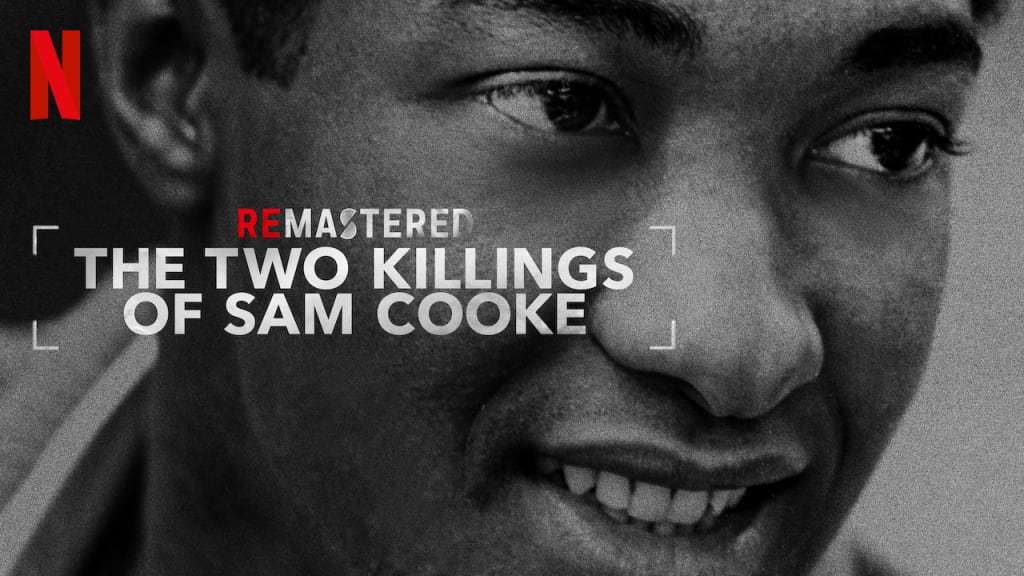The Two Killings Of Sam Cooke - review (Netflix)
What the world lost.

The Two Killings Of Sam Cooke is a documentary by Kelly Duane that is emotionally resonant but ultimately underwhelming. In essence, it rehashes the story of Cooke’s death and how it was shrouded in and remains shrouded in mystery. That is the first and obvious killing.
The second killing is more opaque, speaking to his growing impact in black society and influence in an America growing through the Civil Rights movement, with blacks in the south still suffering segregation and inequality.
The second death is how Cooke’s growing influence in black America was growing at a rate that some felt it needed to be checked.
Unfortunately, Duane’s documentary devotes very little time to the murder and the circumstances surrounding it, instead preferring to focus on Cooke’s career, life and influences.
That is not to say the documentary is bad. It is, for the most part, a very engaging film. It is just that the title of the documentary gives one a very different expectation.
What the documentary does very well, is to tell us about Cooke’s musical journey and how focussed he was in politics and his beliefs. His talent as a singer was discovered early and he was a star in his twenties, his good looks helping him to crossover to white audiences in a time when segregation was still commonplace.
His father was a pastor and used to take his children around to churches to sing. Sam, like a lot of black singers from that era, started with gospel music. Later, singing as part of a group, The Soul Stirrers, Cooke gained fame throughout the black community.
His family moved north to Chicago, to get away from the still racially oppressive south. When he travelled around with The Soul Stirrers, as a young adult, heading back to the south, he saw and experienced how very differently black people were treated there.
According to those who knew Cooke, the murder of Emmet Till had a profound effect on him. Emmet Till was a young black boy, fourteen years old, who was lynched and beaten to death because he had the temerity to, allegedly, whistle at a white woman.
Till’s death and the savagery of it, triggered not only Cooke but most of black America. Many believe it was the catalyst for the Civil Rights movement.
Rock n’ roll was beginning to come to prominence across America and the youth were embracing it. Cooke was reluctant, like a lot of the black acts and singers who came from gospel singing, to cross over to rock n’ roll.
Amongst church communities, rock n’ roll was considered the Devil’s music. He knew if he crossed over to rock n’ roll, he could never go back.
He also knew what he wanted. He wanted to be famous and be able to reach a lot of people and help his people.
He would not be able to do that with gospel music. On his first foray into rock n’ roll and pop, getting away from gospel music, he did not use his first name, instead going under the name Dale Cook. His next song catapulted him to national stardom.
You Send Me was a hit. It got him invited on to the Ed Sullivan Show and had black people gathering around television sets, televisions not being common in black households at that time, to see him.
He got invited on to American Bandstand by Dick Clark. American Bandstand was a show that was, perhaps, the most influential music show for young people at the time.
The Klu Klux Klan did not want him going on the show. They threaten to blow up the studio if Sam Cooke appeared on the show. They also threaten Cooke.
Dick Clark had reservations but went ahead anyway, Cooke appearing on American Bandstand.
Cooke got married and moved to California, closer to the Mecca of television and film. He continued to appear on television. He was becoming very successful and was only second to Elvis Presley in record sales. He was famous.
Sam did not like that, as a black performer, with all of his fame, he would till be invited to play at venues where segregation was a thing. He refused to play at such venues and stopped playing in segregated states.
He would go on to meet other prominent black men of his time; Muhammad Ali, who at that time went under the name of Cassius Clay, and Malcolm X.
Cooke started a record company and understood that controlling the music and the rights to the music was where the money was. He also wanted to protect black artist, many of whom had been burnt by record companies giving them contracts that did not benefit them at all.
Even as a person who understood this, Cooke was not immune to getting ripped off himself and found himself unwittingly, in an unfavourable contract drawn up by Allen Klein, an account, days before he died.
Cooke’s popularity kept growing. His friendship with Ali and Malcolm X bringing him to the attention of the FBI, who were watching both men. Cooke's crossover appeal was admired by the money men but his refusal to leave his black roots behind did not sit well with them.
Cooke wanted to create a black music agency. Organised crime - the mob -, whose tentacles tended to be in anything that made money, tried to discourage him.
The death of his son, Vincent, by drowning, really affected Cooke and he plunged himself into work. He also started seeing other women, his marriage suffering.
He made a deal with RCA as a subsidiary of their label. This was the deal that involved Klein. When he found that Klein was ripping him off, he had planned to fire him.
Unfortunately, he was killed before he would see Klein again. His death, murder, happened in strange circumstances. He was shot by a black woman, Bertha Franklin, who claimed Cooke had forced his way into her room and was harassing her.
Franklin had been the manager at the hotel Cooke had gone to that night with another woman, Lisa Boyer, who accused Cooke of trying to kidnap her and had escaped, taking his clothes. Cooke had, allegedly, been looking for Boyer when Franklin shot him. Franklin got off with justifiable homicide.
The issue with Duane’s documentary is the title. I found out more about his death reading Wikipedia than I did from watching the documentary.
It may be because the documentary is quite short at only seventy-four minutes long or the focus on his music career but there really is not a great deal about one death, let alone two.
The Two Killings Of Sam Cooke is definitely worth watching but do not watch it hoping to gain any clarity around the mystery surrounding his death. This film will not give you that.
About the Creator
Q-ell Betton
I write stuff. A lot.






Comments
There are no comments for this story
Be the first to respond and start the conversation.